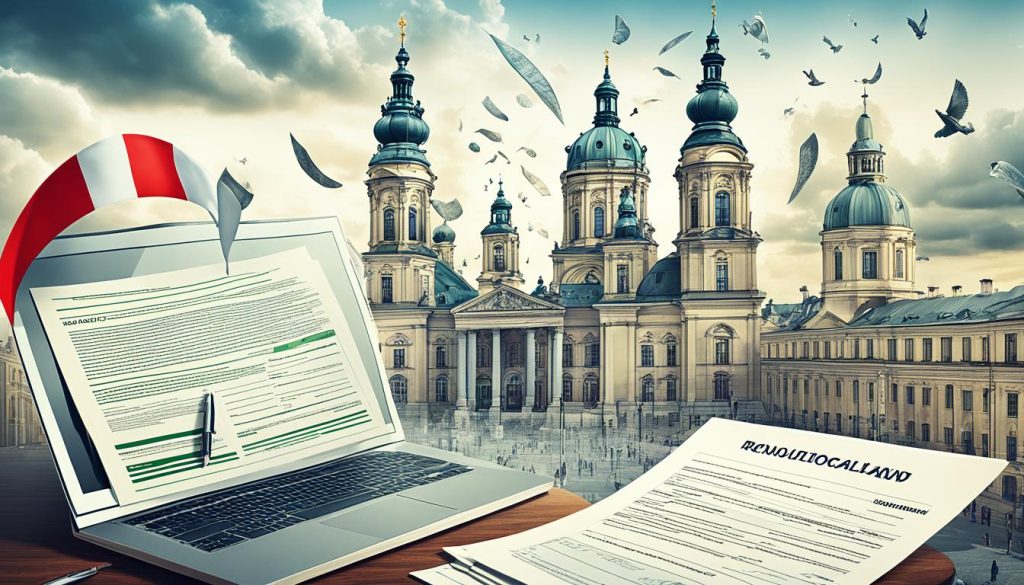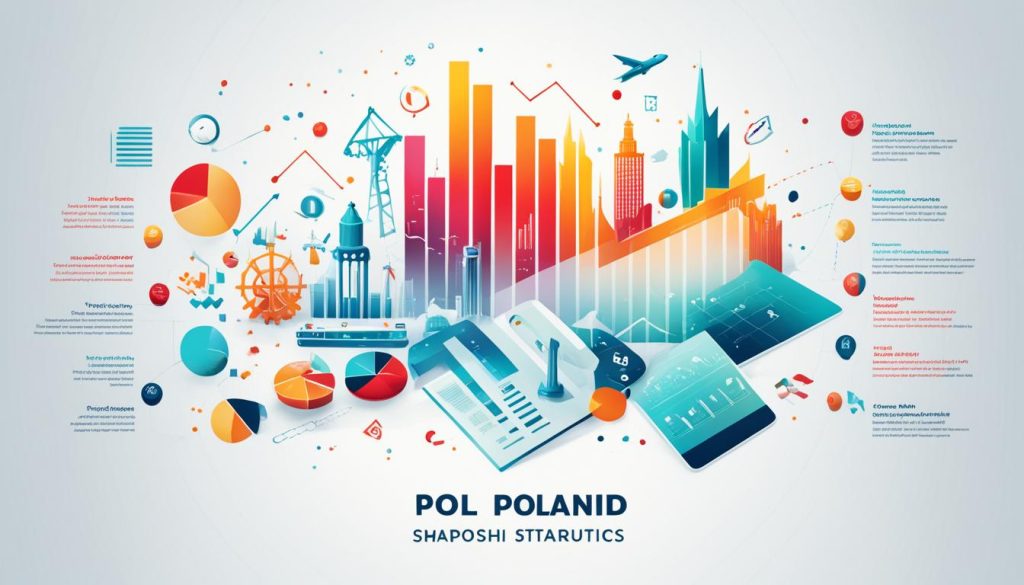Poland showcases a strong economy, attracting business people from around the world. It skillfully mixes old customs with new ways. Knowing how business works here is key. It values respect for leaders, being formal, and building close relationships. In Poland, being on time is important, and people talk directly but politely, often liking detailed talks. They believe in doing quality work while also enjoying their lives, sticking to their work hours.
It’s vital to make trusted friends in business, with first meetings often focused on getting to know each other. In Poland, you need to dress formally for meetings and follow the rules closely, making a good first impression. Fact-based negotiations need patience and attention to detail. Also, social gatherings and giving gifts are big parts of networking, helping to strengthen business bonds.
Key Takeaways
- Poland’s economy is a magnet for foreign entrepreneurs due to its blend of tradition and modernity.
- Local business culture values hierarchy, formality, and personal relationships.
- Punctuality and direct yet diplomatic communication are vital in Polish business environments.
- Quality work is emphasised without conflicting with the work-life balance.
- Formal attire, structured protocols, and first impressions are crucial in business meetings.
- Building trusted relationships is key, with social events and gift-giving enhancing networking.
Overview of Poland’s Economic Growth

Over the last 30 years, Poland has shown impressive economic growth. It has seen a 150% rise in GDP per capita. This makes Poland a model of economic strength in the EU, especially since it grew during the financial crisis. Today, its economy matches Sweden’s, showing Poland’s strong economic progress.
GDP Trends Over the Last 30 Years
The past three decades have transformed Poland’s economy. Through economic freedom, investments, and reforms, Poland has moved forward. The growth in GDP shows a big increase in income and living standards. Poland’s GDP growth is faster than many European countries, proving its steady economic rise.
Key Industries Driving Growth
Several industries are key to Poland’s growth. Important ones include:
- Retail
- Healthcare
- Manufacturing
- Defence
- Fintech
- Aviation
- Cleantech
- Sustainable Transport
- Engage bilingual employees
- Leverage professional services for compliance
- Showcase competitive working conditions
- Companies are required to stay updated with the latest changes in business law compliance in Poland to avoid potential legal issues.
- Maintaining accurate and timely records is crucial for adhering to Polish business regulations and tax obligations.
These sectors have led to economic growth and made Poland important globally. Innovative areas like fintech and cleantech show Poland’s creative force. Meanwhile, traditional areas like manufacturing and defence remain strong. Low labour costs and a good location help Poland be a key trade hub in Central Europe. This boosts its industry and supports ongoing growth.
Key Aspects of Polish Business Culture

In Poland, business culture highly values formality and respects each person’s role. This includes being on time and properly using titles and surnames. Knowing and showing respect and professionalism is vital in Polish business settings.
Formality and Etiquette in Business Settings
In Poland, how you address people is very important in business. Always use titles and surnames during your first meetings. It shows respect. Be sure to arrive on time and act professionally to make a good impression.
The Importance of Hierarchy and Decision-Making Processes
The business world in Poland values hierarchy. Decisions are made from the top down but not without hearing from others first. This ensures everyone’s viewpoint is considered, but in the end, the top management decides.
Business Communication Style
Polish business communication is straightforward but polite. This means explaining things well and giving detailed answers. It helps avoid confusion and makes sure everyone knows what’s going on. Always be clear and thorough in discussions to aid in smooth communication.
Work Ethics and Values in Poland

In Poland, work values are based on honesty, meeting deadlines, and balancing work and life. It’s key for success in Polish business.
Punctuality in Polish Business Culture
Being on time is very important in Poland’s work culture. Meetings and deadlines are respected, showing professionalism and respect. It shows a commitment to quality work.
Building Relationships and Trust
Creating trust is essential in Polish business. It’s about forming strong, honest connections. It means keeping promises and being open in communication. This establishes lasting relationships based on trust and steady performance.
Business Meeting Etiquette

Knowing how to act in Polish business meetings is key. Dressing right and greeting correctly boosts mutual respect and helps things go smoothly.
Proper Attire
In Poland, wearing suits is expected for men, while women should wear conservative outfits. This shows respect and helps make a good first impression.
Meeting and Greeting Etiquette
Start meetings with a firm handshake, look people in the eye, and use their titles. Swapping business cards, with Polish translation, at the beginning builds a strong connection.
Effective Negotiation Techniques

In Poland, to negotiate successfully, mix careful planning, patience, and clear communication to build trust. These are the core of strong negotiation strategies there. They ensure smooth talks and good results for everyone.
Preparation and Patience
The first step is thorough preparation. Polish businesses value being ready and detailed analysis a lot. Knowing your stuff well makes you credible right away. Also, being patient is key. Decisions can take a while because Poles are careful and exact, so stay calm and persistent.
Building Trust through Clear Communication
For trust in Polish negotiations, clear and honest talk is vital. It means sharing facts and detailed explanations. Making personal connections is also important for trust and respect. Talk openly, show real interest, and be straightforward. This helps a lot in becoming trusted in business deals.
Using these negotiation methods helps deal with Polish business talks better and more effectively.
Networking and Socialising in Poland

Joining in on Polish business events is a key way to network in Poland. These functions are central to the business scene. They create a great spot to make and grow work-related ties.
The Role of Social Events
These Polish events often feature group meals and warm welcomes. Here, professionals come together to chat about opportunities and build bonds in a laid-back atmosphere. They’re not just about sharing work ideas. They also help in getting to know each other’s backgrounds, which helps in working together later.
Gift-Giving Customs in Business
When it comes to Polish business, giving gifts shows respect and a desire to keep a strong bond. Common choices include flowers and sweets. However, corporate gifts should match the recipient’s tastes and interests. Following these gift-giving rules can really improve your connection with business mates.
Challenges for Foreign Entrepreneurs

Getting into business in Poland comes with its challenges for foreigners. One big hurdle is dealing with the complex bureaucracy. This can take a lot of time and requires knowing the local rules well.
Then there’s the language barrier. Despite many people speaking English, doing day-to-day business often needs Polish. This might mean you need to hire staff who speak both languages.
Finding skilled workers in a country with low unemployment is tough. To attract the best, offering good work conditions and benefits is key. It’s smart to get help from professionals for legal and business advice. This ensures you follow local laws.
Business Statistics and Culture in Poland

Poland is in a strategic spot as a developed market, according to FTSE Russell. This shows it has a strong economy. The country is also dedicated to business traditions. These factors make it attractive to investors and entrepreneurs.
Economic Indicators
Poland’s economy is growing and robust. They make decisions quickly and have formal meetings to keep things efficient. This makes it easier for foreign companies to work there.
Cultural Nuances
Knowing how Polish culture impacts business is key to doing well there. Respect and being orderly are important in business meetings. They show this through how they dress and greet each other. This shows how important professionalism and structure are in Poland’s business world.
Regulatory Compliance in Poland

Getting your business to follow all laws in Poland involves a deep dive into many rules and tax needs. It’s important to know these well to prevent problems during your business journey.
The rules for running a business in Poland are very thorough. You really should work with local experts. They help avoid risks and make sure your business meets all the rules.
To stay on the safe side, talking to known experts is a smart choice. Being ahead in compliance matters reduces the risk of legal trouble. It also makes running your business smoother.
Banking Requirements for Foreigners
If you’re not from Poland but want to bank there, you need to know a few things. It’s key for managing your money well in Poland’s banking world.
Opening a Bank Account as a Non-Resident
Non-residents need proof they’re in Poland to start a bank account. Banks like PKO Bank Polski and ING Bank Śląski need ID and proof you’re financially stable. Get to know what they need to make things go smoother.
Proof of Local Address
Show you have a place in Poland to set up a bank account. Use bills, lease papers, or registration documents. It helps a lot and shows you’re serious about staying.
Banks are strict about this to follow Polish rules.
Opportunities for Investment
Poland’s economy is booming, offering lots of investment chances in different sectors. This makes it a top choice for foreign investors. The investment potential in the Polish market is boosted by some key factors.
The retail sector in Poland is a prime area for investment opportunities in Poland. It’s growing fast because more people are buying things, and they have more money to spend. The healthcare sector is also ripe for investment. It’s getting upgraded and puts a big focus on research and development.
The technology sector in Poland is another area full of promise. It’s known for its impressive innovations and skilled workers. Poland’s spot in Central Europe makes it even more appealing. It works as an entry point to other big European markets. Low labour costs and great incentives also make Poland more inviting for investors.
A key factor making Poland attractive for investment is its good business environment. The government gives tax breaks and grants to attract foreign money. These are especially for high-tech and green energy projects. The country’s infrastructure is top-notch, too. It ensures businesses operate smoothly in various industries.
To sum up, Poland’s strong economy and strategic location are big pluses. Add to these a skilled workforce and government backings, and you see why it’s great for investment. All these factors mean businesses can do well and grow in Poland’s lively market.
Impact of EU Membership on Business
Since joining the European Union, Poland has seen great benefits. Businesses find it easier to set up thanks to low-entry barriers. There’s also access to EU funds, aiding in growth and building infrastructure.
Being in the EU also helps Poland in the common market. It makes trade and investment with other EU countries smoother. This boosts Poland’s economic relations, including with nations like Sweden.
The EU membership aids Poland in trade on a global level. It aligns with EU laws, helping Poland secure beneficial trade deals. This supports Poland’s economic stability and growth.
Importance of Location and Logistics
Poland is at Europe’s heart, making it ideal for targeting the vast European market. Its strategic spot offers many benefits for businesses wanting efficient logistics.
Central European Trade Hub
Poland serves as a Central European business hub, giving quick access to major European markets. Its central location means shorter delivery times. It also leads to better distribution efficiency, thanks to Europe’s big transportation networks.
Proximity to Key Markets
Poland’s closeness to important markets reduces transportation costs and speeds up market access. This advantage, along with good infrastructure and a skilled workforce at competitive prices, places Poland as a top spot for manufacturing and distribution.
Cultural Insights for Successful Business
To do well in Poland’s lively market, getting Polish business traditions right is key. You’ll need to go for formal hellos and dress right. When you meet someone, expect to shake hands, use surnames, and titles. This shows respect and the value of a good first impression. Getting this right boosts your image and helps in making meaningful business links.
Also, Polish businesses favour clear contracts over just talking things out. This shows their love for being reliable and organized. By respecting this need for written agreements, you’ll avoid confusion and build trust. In Poland, a thorough contract is the backbone of a clear, trustworthy business deal.
But understanding Polish business isn’t just about following these rules. It’s also about getting the little things in daily interactions. It’s knowing when to show respect for leaders while also valuing everyone’s input. Showing you get these cultural details makes you a thoughtful and sharp business ally. This way, you’re all set to tackle the challenges of the Polish market.







